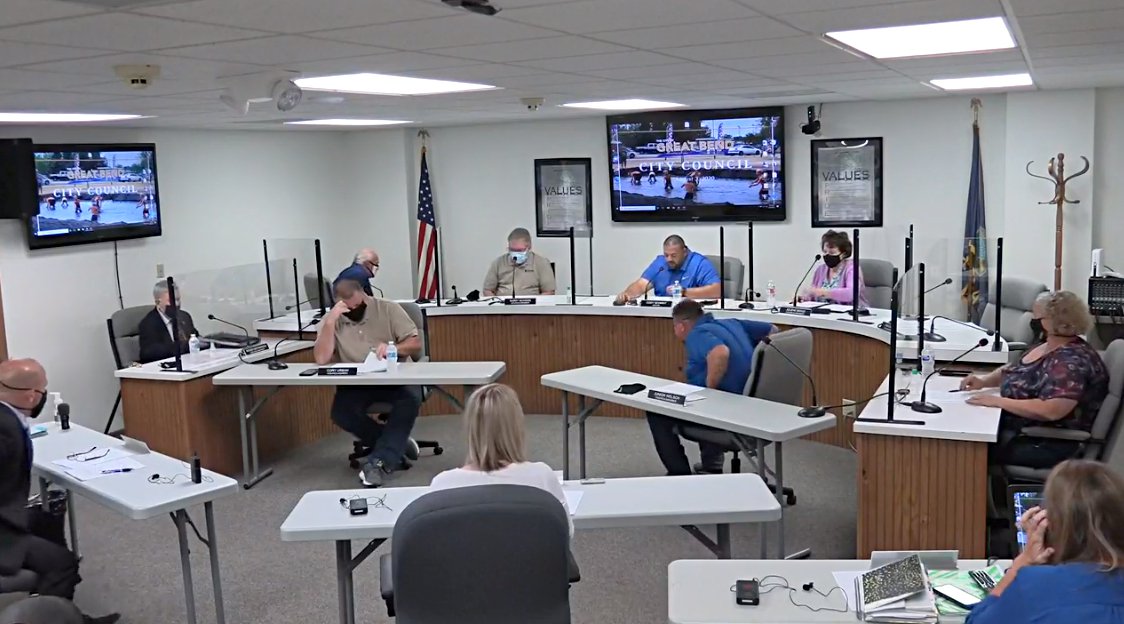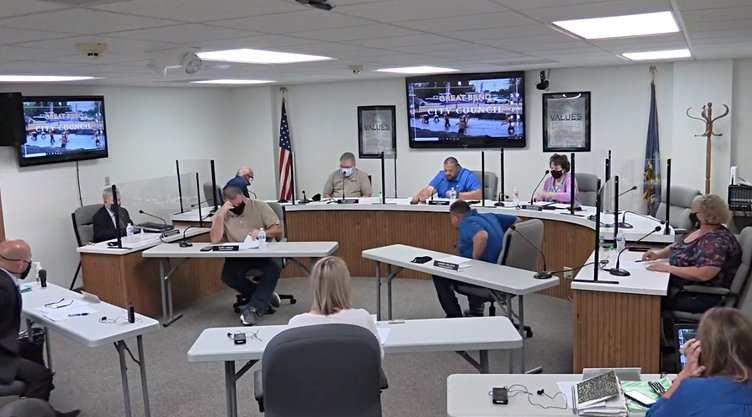Great Bend City Council meeting at a glance
Here is a quick look at what the Great Bend City Council did Monday night:
• Approved a memorandum of understanding between the Great Bend Fire Department and the Office of the Kansas State Fire Marshal.
• Authorized Mayor Cody Schmidt to sign an easement granting Wheatland permission to place a portion of the electric service for the Dry Lake Brewery in the city’s parking lot.
The Dry Lake Brewery has learned their electric demand will be greater than Wheatland can furnish on the installed electric service. In order to install the correct service Wheatland has determined that the service should be placed on the ground with the actual service running underground to the brewery.
The only area available is the city’s parking lot located to the west of the building. The electric service box will take up one parking space. City Attorney Robert Suelter and City Inspector Logan Burns reported on the matter.
• Heard a departmental update from City Administrator Kendal Francis. He focused on the requirement of wearing face masks in city facilities due to COVID-19 and the Aug. 17 budget public hearing.
• Heard an economic development update from Great Bend Economic Development Inc. Board member Mark Calcara. Highlighted was the hiring of new GBED President Sara Hayden.
• Approved abatements at: 301 Walnut, Accumulation of Trash/Refuse, Delbert and Lucille Lewis; 701 Hubbard, Accumulation of Trash/Refuse, Juana Leyva Gonzalez; 713 Holland, Accumulation of Trash/Refuse, Mayra Contreras; 3017 10th, Accumulation of Trash/Refuse, Bar-None Construction and Retreat @ Great Bend LLC.; and 1200 Monroe, Accumulation of Trash/Refuse, Tyler Reeves.
Realizing the value and importance of sharing search and rescue services across the state, the Great Bend City Council Monday night authorized Fire Chief Luke McCormick to sign a memorandum of under standing with the Kansas State Fire Marshal’s Office for participation the Kansas Task Force 1.
The council met Monday without the public present. With a surge in COVID-19 cases locally, the city returned to closing the meetings and streaming them live for public access.
“We have trained. We have been called up,” McCormick said of Great Bend’s participation in the program. “But we have never been deployed. At t his point, we have never had to respond.”
The Great Bend Fire Department has been a participating member with Task Force 5, a group of eight fire departments from the South Central region of Kansas that cooperates in the Kansas Search and Rescue Response System. The State Fire Marshal’s Office coordinates this system among the South Central and other six state task forces.
Kansas is divided geographically into seven Homeland Security regions: Northwest, Southwest, North Central, South Central, Northeast, Southeast, Kansas City Metro. According to the capability identified in each region, a urban search and rescue team made up of participating agencies are formed according to the National Incident Management System.
The Fire Marshal’s Office also coordinates the Kansas Task Force 1 utilizing qualified personnel from the seven Task Forces to form an Interstate response team. On Dec. 5, 2016 the City Council authorized then Fire Chief Mike Napolitano to sign the MOU with the KFM to participate in the interstate team.
Now, the KFM has sent out request for a new MOU with all participating agencies.
Councilman Brock McPherson questioned the city’s cost to take part.
McCormick said the city covers the overtime for firefighters to attend training. But, should the team be deployed, the state would reimburse the city for the expenses.
The new memo is intended to:
• Coordinate and support the development of comprehensive regional and state plans that will provide for a coordinated response by urban search and rescue resources.
• Coordinate regional and state efforts through equipment standardization, training, and operational guidelines.
• Maintain consistency and coordination with other regional, state, and federal resources, including federal and state US&R task forces and/or teams.
• Provide for the availability of services and expertise required to respond to disaster events where such services and expertise are not available
Urban search and rescue is a multi-hazard discipline that involves the location, extrication, and initial medical stabilization of victims trapped or missing because of a man-made or natural disaster, the Fire Marshal’s Office notes. While a tornado or other significant weather event is often the cause, victims can also be trapped by events such as winter storms, mine or bridge collapses, wide area flooding, or other significant events.
These events can occur in rural areas, suburban areas, or in densely populated urban areas. They may be slow in developing, as in the case of winter storms or wide area river flooding, or they may be sudden, as in the case of an earthquake, explosion, or tornado.
Since these types of catastrophic events can quickly overwhelm first responders, the KMF realizes it is critical that there is a comprehensive statewide response system in place that can quickly provide resources for search and rescue operations that are beyond the capabilities of local responders. These events require a highly coordinated response by personnel specially trained and equipped to deal with the unique challenges presented by collapsed or unstable structures, floods, or other complex rescue situations.
Kansas House Bill 2097, enacted May 2015, designated the KFM as the administrative agency for the Kansas Search and Rescue Response System, and authorized the KFM to enter into agreements to establish regional search and rescue teams to respond to search and rescue incidents. It further authorized the OSFM to develop rules and regulations governing the composition, training requirements, response, and operations of those regional search and rescue teams.





